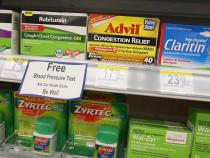Here's The Real Difference Between All Those Allergy Medications


Scott Olson / Getty Images
The dozens of types of allergy medication found at your local pharmacy can be overwhelming, but fear not.
Second-generation over-the-counter medications like Claritin, Zyrtec, and Allegra — which improve upon old options like Benadryl by not putting you to sleep — are more similar than they are different.
You just have to answer a couple of basic questions to figure out which to choose. Of course, it is always a good idea to talk to your doctor before trying any new medication.
1. Do you need a decongestant?
If you're shopping for allergy medication, we'll assume your eyes are itchy, your nose is running, and you can't stop sneezing. But if you can still breathe through your nose, proceed to Step 2. If you can't, consider an allergy medication with an added decongestant.
Antihistamines combined with a decongestant are usually marked with a "D."
Claritin-D, Allegra-D, and Zyrtec-D all contain a decongestant called pseudoephedrine, the same active ingredient that powers Sudafed. It makes your nose feel less stopped up by narrowing the blood vessels inside your nostrils.
Pseudoephedrine's usefulness when making methamphetamine means that in the United States, these drugs need to be purchased directly from the pharmacist with a government ID.
If your primary symptom is a stuffed up nose, you can also ask your doctor about decongesting nasal sprays. Most require a prescription, but Nasacort is one that just became available over the counter.
2. What's the difference between Allegra, Claritin, and Zyrtec?
With or without a decongestant, Allegra, Claritin, and Zyrtec are all antihistamines, meaning they calm down your body's immune reaction to allergens like pollen or animal dander.
"They have different active ingredients but are all in the same family of drugs," Dr. Sakina Bajowala, an Illinois-based allergist, explains. "They are all considered to be non-sedating or low-sedating anti-histamines (sic), and they are all very effective."
That said, they do have some very slight differences — which probably aren't noticeable to every user. Allegra is the least likely to make you drowsy. Claritin is long-acting, with effects that last for 24 hours. Zyrtec acts the fastest — usually within one hour — but is also the most likely to make you drowsy, so avoid driving, alcohol, and sedatives as you figure out how you react.
You can also find out whether any of your other medications will interact with Allegra, Claritin, or Zyrtec.
3. What about generic brands and cost?
Don't hesitate to use generic brands. The same antihistamine in Zyrtec, for example, is available as Aller-Tec at Costco, as Wal-Zyr at Walgreens, or even totally "unbranded" almost anywhere.
Just pay attention to labels so you know which active ingredient you're getting. The active ingredient in Claritin is loratadin, in Allegra it's fexofenadine, and in Zyrtec it's cetirizine.
Consumer Reports reviewed all major allergy medications and found that monthly costs range considerably depending on which one you choose. Their "best buy" recommendations were for the 10mg tablets of cetirizine, loratadin (also available in dissolving and liquid forms), and Alavert (a "branded generic" of loratadin).
The average monthly cost of generic cetirizine, for example, is $11, while its branded version, Zyrtec, is $19.
4. So which one should you choose?
This may sound obvious, but the key thing to pay attention to is not what's written on a box, but what actually works for you. "Some people may respond well to one anti-histamine while getting no benefit from another," Consumer Reports advises in its guide.
In a Washington Post Health Talk about allergies, Dr. Daniel Ein, a professor at George Washington University School of Medicine and a practicing allergist since 1972, gave this advice: "My rule about the best one antihistamine is: It's the one that gives you (the individual) the greatest relief with the fewest side effects at the lowest price."
So if one antihistamine isn't working for you, try a different one.
A doctor can also talk to you about prescription antihistamines, and — if your symptoms persist — immunotherapy, which can help desensitize you to what's causing a reaction in the first place.
Most importantly, talk to your pharmacist and a board-certified allergist.
More From Business Insider

